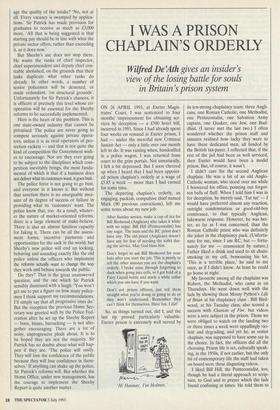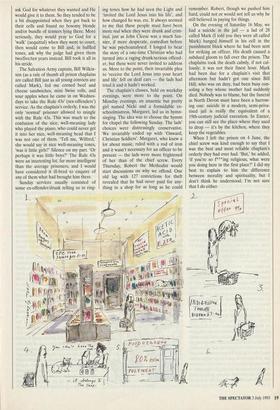I WAS A PRISON CHAPLAIN'S ORDERLY
Wilfred De'Ath gives an insider's
view of the losing battle for souls in Britain's prison system
ON 26 APRIL 1993, at Exeter Magis- trates' Court, I was sentenced to four months' imprisonment for obtaining ser- vices by deception — a £500 hotel bill, incurred in 1991. Since I had already spent four weeks on remand in Exeter prison, I had — under the merciful new Criminal Justice Act — only a little over one month left to do. It was raining when, handcuffed in a police wagon, I was returned from court to the grim portals. Not unnaturally, I felt a bit depressed. But I soon cheered up when I heard that I had been appoint- ed prison chaplain's orderly at a wage of £5.85 a week — more than I had earned for some time.
The departing chaplain's orderly, an engaging, puckish, compulsive thief named Mark (90 previous convictions), left me some notes about my new job:
After Sunday service, make a cup of tea for Bill Birdwood (Anglican) who takes it white with no sugar. Bill Hill (Pentecostalist) has one sugar. The nuns and the RC priest don't have any. The old priest (Anglican) doesn't have any for fear of needing the toilet dur- ing the service. May God bless him.
Don't forget to ask Bill Birdwood for your halo after you start the job. This is purely to tell the other inmates you are the chaplain's orderly. I broke mine through forgetting to duck when going into cells, so I got hold of a Fairy Liquid bottle and made a white collar which you can have if you want.
Don't ask prison officers, just tell them straight what you're doing or going to do or they won't understand. Remember they can't think for themselves. Have fun. I did!
So, as things turned out, did I, and the last tip proved particularly valuable. Exeter prison is extremely well served by 'Hi Hannay, I'm Holmes.' its ten-strong chaplaincy team: three Angli- cans, one Roman Catholic, one Methodist, one Pentecostalist, one Salvation Army captain, one Quaker, one Jew, one Bud- dhist. (I never met the last two.) I often wondered whether the prison staff and inmates realised how lucky they were to have these dedicated men, all funded by the British tax-payer. I reflected that, if the rest of the jail had been as well serviced, then Exeter would have been a model prison. But, of course, it wasn't.
I didn't care for the second Anglican chaplain. He was a bit of an old Anglo- Catholic woman, who stood over me while I hoovered his office, pointing out forgot- ten balls of fluff. When I told him I was in for deception, he merely said, 'Tut tut' — I would have preferred almost any reaction, outright condemnation or good-old-boy connivance, to that typically Anglican, lukewarm response. However, he was bet- ter, so far as I was concerned, than the Roman Catholic priest who was definitely the joker in the chaplaincy pack. (Unfortu- nate for me, since I am RC, but — fortu- nately for me — ecumenical by nature.) Father liked a drink and used to sit chain- smoking in my cell, bemoaning his lot. 'This is a terrible place,' he said to me once, as if I didn't know. At least he could go home at night.
My favourite among all the chaplains was Robert, the Methodist, who came in on Thursdays. He went down well with the lads by showing them Monty Python's Life of Brian at his chaplaincy class. Bill Bird- wood, at his Tuesday class, also scored a success with Chariots of Fire, but videos were a sore subject in the prison. Those we were obliged to watch on the landing two or three times a week were appallingly vio- lent and degrading, and yet he, as senior chaplain, was supposed to have some say in the choice. In fact, the officers did all the choosing. Prison life is set, culturally speak- ing, in the 1950s, if not earlier, but the only bit of contemporary life the staff had taken on board were these disgusting videos.
I liked Bill Hill, the Pentecostalist, too, though he had a literal approach to scrip- ture, to God and to prayer which the lads found confusing at times. He told them to ask God for whatever they wanted and He would give it to them. So they tended to be a bit disappointed when they got back to their cells and found no bosomy blonde and/or bundle of tenners lying there. More seriously, they would pray to God for a 'walk' (acquittal) when they went to court, then would come to Bill and, in baffled tones, ask why the judge had given them two/five/ten years instead. Bill took it all in his stride.
The Salvation Army captain, Bill Wilkin- son (as a rule of thumb all prison chaplains are called Bill just as all young convicts are called Mark), fed me corned beef and cheese sandwiches, mini Swiss rolls, and sour apples when he came in on Wednes- days to take the Rule 43s' (sex-offenders') service. As the chaplain's orderly, I was the only 'normal' prisoner allowed to mingle with the Rule 43s. This was much to the confusion of the nice, well-meaning lady who played the piano, who could never get it into her nice, well-meaning head that I was not one of them. 'Tell me, Wilfred,' she would say in nice well-meaning tones, 'was it little girls?' Silence on my part. 'Or perhaps it was little boys?' The Rule 43s were an interesting lot, far more intelligent than the average prisoners, and I would have considered it ill-bred to enquire of any of them what had brought him there.
Sunday services usually consisted of some ex-offender/drunk telling us in ring-
ing tones how he had seen the Light and 'invited the Lord Jesus into his life', and how changed he was, etc. It always seemed to me that these people must have been more real when they were drunk and crim- inal, just as John Cleese was a much fun- nier, if more desperate, comedian before he was psychoanalysed. I longed to hear the story of a one-time Christian who had turned into a raging drunk/serious offend- er, but these were never invited to address us. More to the point, their invariable plea to 'receive the Lord Jesus into your heart and life' fell on deaf ears — the lads had tried it and it hadn't worked.
The chaplain's classes, held on weekday evenings, were more to the point. On Monday evenings, an anaemic but pretty girl named Nicki and a formidable ex- schoolmistress, Margaret, led us in hymn- singing. The idea was to choose the hymns for chapel the following Sunday. The lads' choices were distressingly conservative. We invariably ended up with 'Onward, Christian Soldiers'. Margaret, who knew a lot about music, ruled with a rod of iron and it wasn't necessary for an officer to be present — the lads were more frightened of her than of the chief screw. Every Thursday, Robert the Methodist would start discussions on why we offend. One old lag with 127 convictions for theft revealed that he had never paid for any- thing in a shop for as long as he could
remember. Robert, though we pushed him hard, could not or would not tell us why he still believed in paying for things.
On the evening of Saturday 16 May, we had a suicide in the jail — a lad of 28 called Mark (I told you they were all called Mark) hanged himself in his cell in the punishment block where he had been sent for striking an officer. His death caused a subdued gloom to fall over the prison. The chaplains took the death calmly, if not cal- lously; it was not their finest hour. Mark had been due for a chaplain's visit that afternoon but hadn't got one since Bill Hill, who was on duty, had been busy con- soling a boy whose mother had suddenly died. Nobody was to blame, but the funeral in North Devon must have been a harrow- ing one: suicide in a modern, semi-priva- tised jail is really the equivalent of a 19th-century judicial execution. In Exeter, you can still see the place where they used to drop — it's by the kitchen, where they keep the vegetables.
When I left the prison on 4 June, the chief screw was kind enough to say that I was the best and most reliable chaplain's orderly they had ever had. 'But,' he added, 'if you're so f***ing religious, what were you doing here in the first place?' I did my best to explain to him the difference between morality and spirituality, but I don't think he understood. I'm not sure that I do either.



















































 Previous page
Previous page